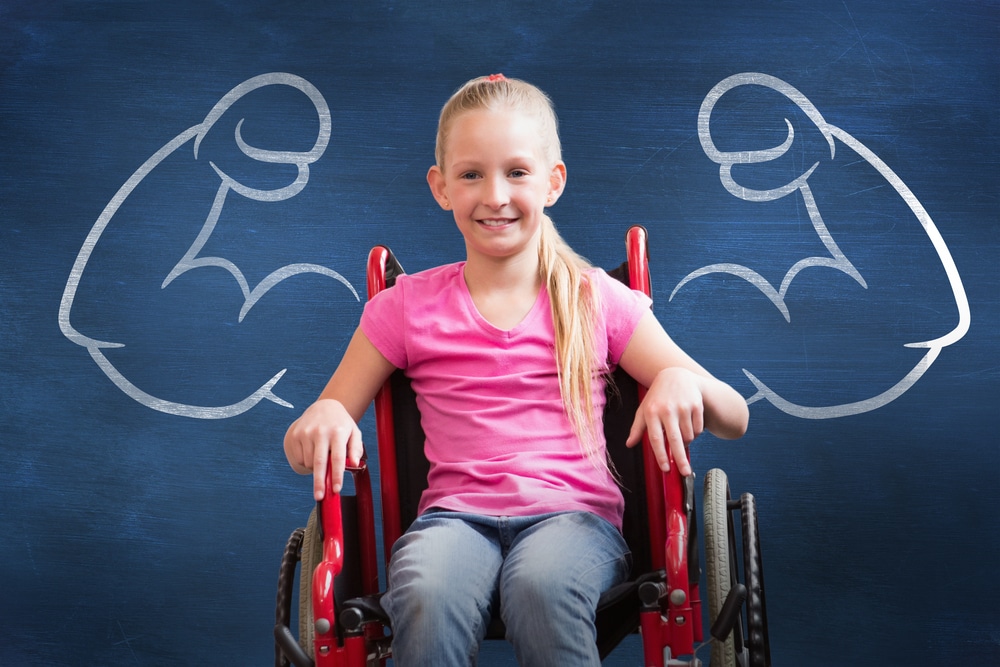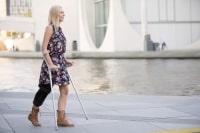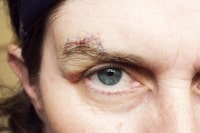Letölthető tartalmak
A disability is an aspect of a person that limits them in some way. Physical disabilities limit the way the body works. For example, some people need glasses because they do not see well. Other people do not walk and use wheelchairs. Developmental disabilities limit some people’s thinking. Other terms for this include retardation, mentally handicapped and special needs. For instance, Down Syndrome is an example of a developmental disability. People with disabilities try to live just like other people do. They sometimes need special equipment such as special cups to drink from or accessible buildings (with ramps, elevators, wide doorways and plenty of room beside the toilet, for example).
According to a recent survey two-thirds of people feel uncomfortable or awkward talking to somebody who is disabled. Firstly, because they feel sorry for people with disabilities. Secondly, because they are afraid that they will say something wrong. What’s important is that you respect the person and see them beyond their disability.
The most important question many people have is: What is appropriate terminology, for example, disability, impairment, or handicap? When you’re working with someone, you can ask what terminology he or she prefers. Some people prefer different terms, some get very upset about terminology, and some don’t care. Some people really appreciate the opportunity to talk about their disability and educate people about accessibility issues, and others don’t like to talk about it at all.
Before you help someone, ask whether they need help. In some cases a person with a disability might seem to be struggling, yet they are fine and would prefer to complete the task on their own.
If you are talking to a person who is hard of hearing and uses an interpreter, make sure you focus your interaction with the person you are talking to and not to the interpreter. If you will be speaking for some time with a person in a wheelchair, sit down so that you are at eye level with them so they don’t have to strain their neck to look up to you.
Avoidpotentially offensive terms or euphemisms. Commonly accepted terminology includes people with disabilities” and “a person with a visual/hearing/physical/speech/cognitive impairment”. Also, be aware of personal space. Some people who use a mobility aid, such as a wheelchair, walker, or cane, see these aids as part of their personal space. Don’t touch, move, or lean on mobility aids. This is also important for safety.

AFFIRMATIVE LANGUAGE | LANGUAGE TO AVOID |
person with a disability, people with disabilities, disabled | handicapped, cripple, victim, crip, unfortunate, defective, handi-capable |
wheelchair user, uses a wheelchair | wheelchair-bound |
blind, low vision, partially sighted | blind as a bat, sightless, the blind |
mobility disability | deformed, maimed, paralytic, lame |
psychologically/emotionally disabled, emotional disorder | the mentally ill, mental, crazy, insane |
developmentally disabled | retard, mentally defective |
birth anomaly, congenital disability | birth defect, mongoloid |
a person who is deaf or hard of hearing | suffers a hearing loss, the deaf |
person with epilepsy | spastic, epileptic, spaz |
speech disability, communication disability | tongue-tied |
non-vocal, a person who is non-verbal | mute, dumb |
a person of short stature, little person | midget, dwarf |
learning disability | slow |
chronic illness | suffers from, afflicted, stricken with |
Injury means a harm or hurt. Usually an injury is when the body or a part of the body is damaged by something. Another word for physical or mental injury is trauma. Injury can be:
environmental– burns from heat or injury from cold
penetrating injury – when a sharp object, like a knife pierces the body
blunt injury – when something hits the body (like punching someone or falling from a tree)
chemical – being hurt by chemicals like burns from acid
Injury can be accidental or intentional. Intentional injury is when someone tries to hurt another person. (Intentional injury is also called non-accidental injury.) Accidental injury is when no one meant to hurt the injured party. An injury can be:
serious injury – komoly sérülés
minor injury – kisebb sérülés
multiple injuries – többszörös sérülés
internal injury – belső sérülés
fatal injury – halálos sérülés
Other collocations:
to suffer an injury – sérülést szenvedni
to sustain an injury (used especially in newspaper reports) – sérülést szenvedni
to escape/to avoid an injury – megúszni egy sérülést
|
|
|
|
Her arm is in plaster. | She is in a wheelchair. | His arm is in a sling. | She is walking on crutches. |
Be van gipszelve a keze. | Kerekesszékben van. | Fel van kötve a karja. | Mankóval jár. |
|
|
|
|
He needs a walking stick. | His hand is bandaged up. | She has had to have stitches on her eyebrow. | She can’t walk without a zimmer frame/ walker. |
Botra van szüksége a járáshoz. | Be van kötözve a keze. | Össze kellett ölteni a szemöldökét. | Nem tud járni járókeret nélkül. |
Vocabulary
disability | fogyatékosság |
to limit | behatárolni |
wheelchair | kerekes szék |
developmental | fejlődési |
retardation | visszamaradás, retardáció |
special needs | különleges igényű |
equipment | felszerelés |
accessible | akadálymentes |
ramp | rámpa |
survey | felmérés |
awkward | kellemetlen, ciki |
terminology | szóhasználat |
impairment | károsodás |
handicap | hátrány, fogyatékosság |
to appreciate | értékelni |
to struggle | küzdeni |
to avoid | elkerülni |
offensive term | sértő kifejezés |
euphemism | szépítő kifejezés |
mobility aid | mozgásban segítő eszköz |
walker | járókeret |
cane | bot |
to lean on | rátámaszkodni |
cripple | béna |
wheelchair-bound | kerekes székhez kötött |
congenital | veleszületett, születési |
to be afflicted with/by | valamitől sújtott |
environmental | környezeti |
burns | égések |
penetrating | szúrt |
to pierce | megszórni |
blunt | tompa |
acid | sav |






.jpg)






